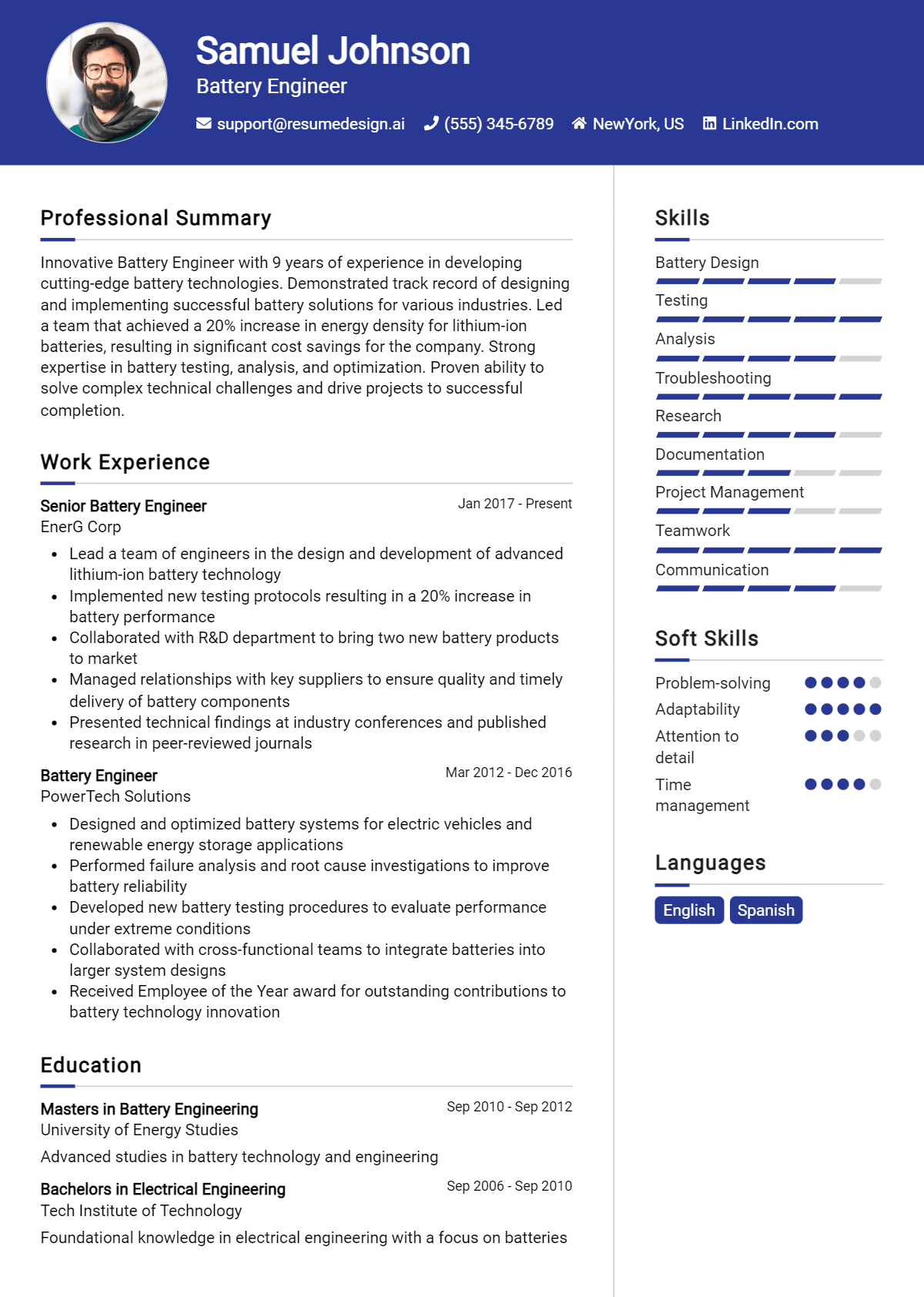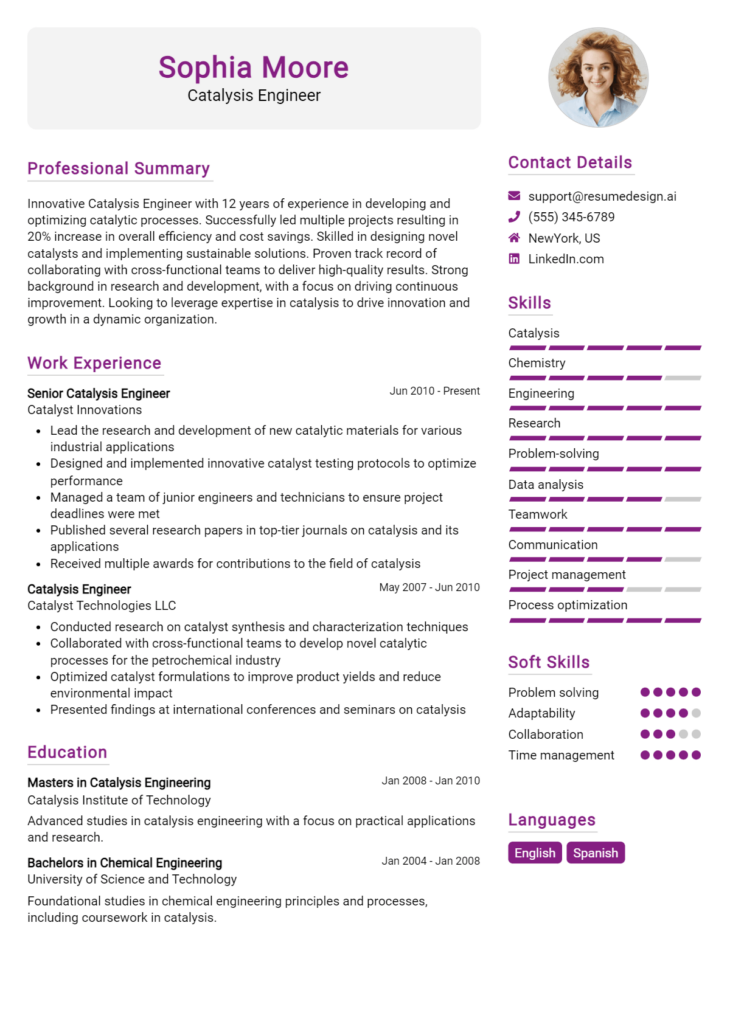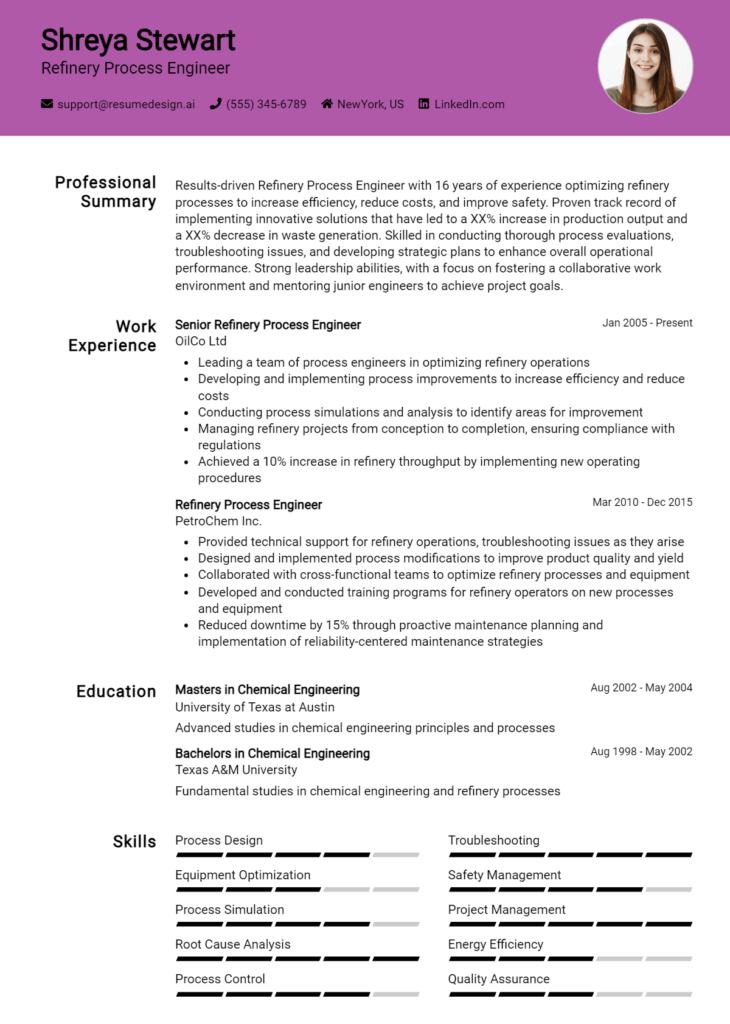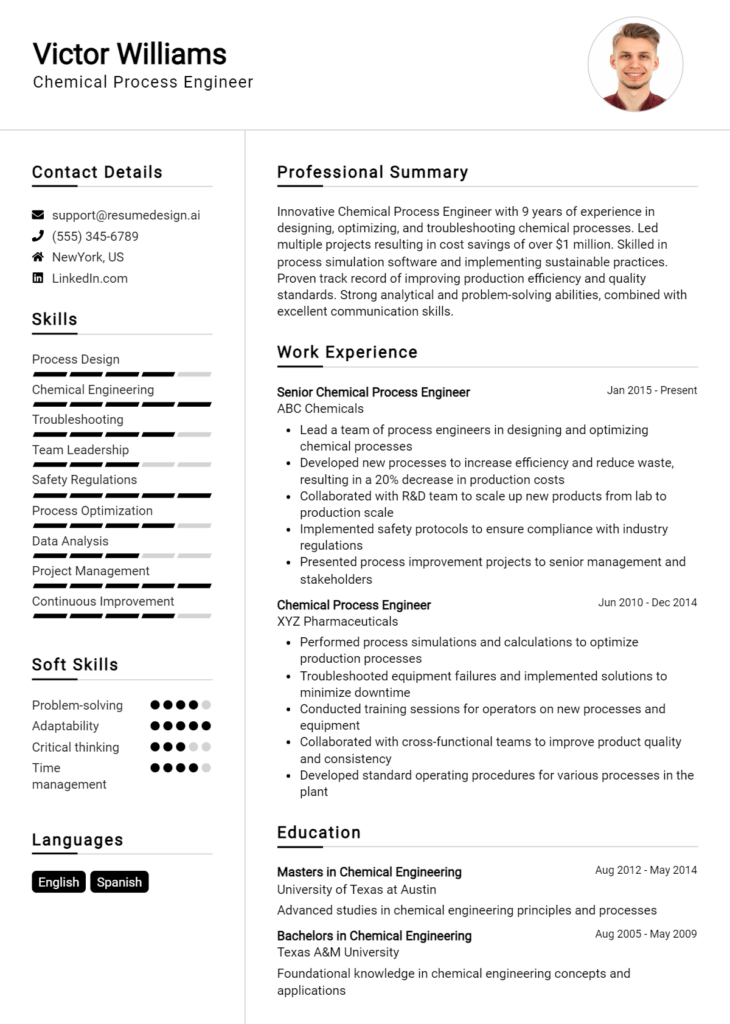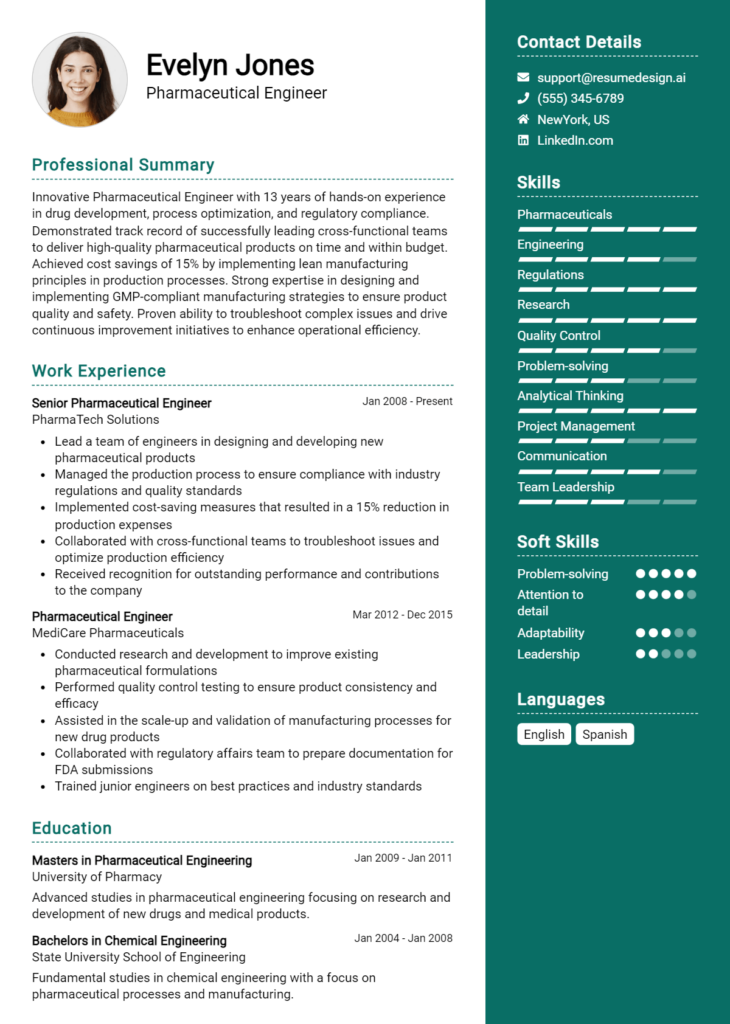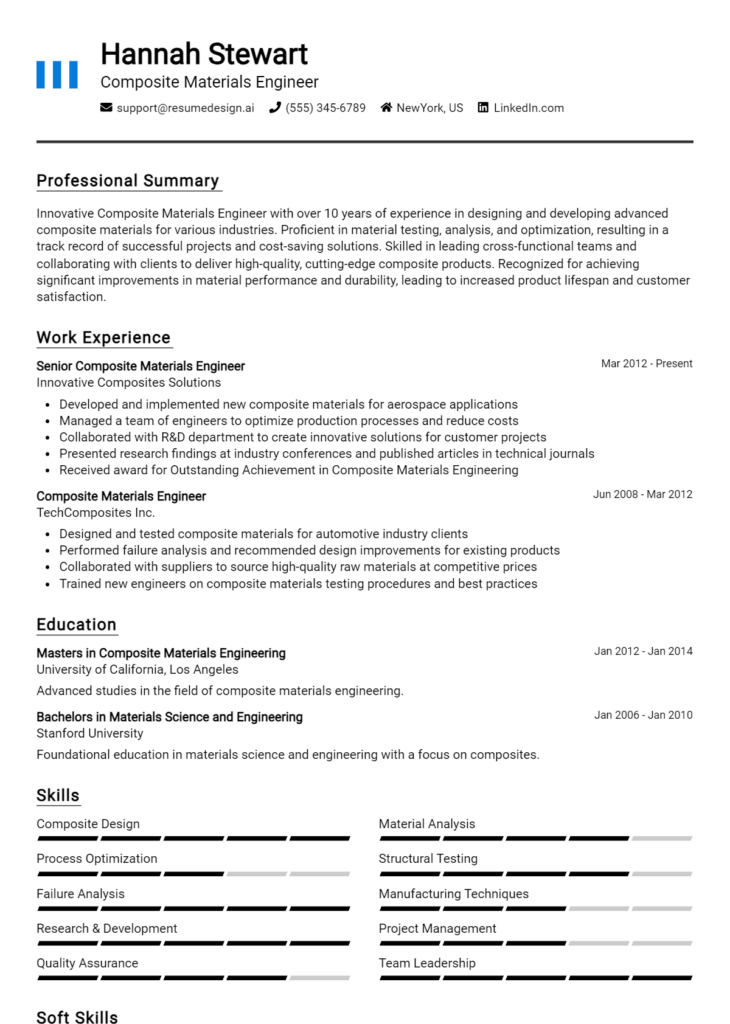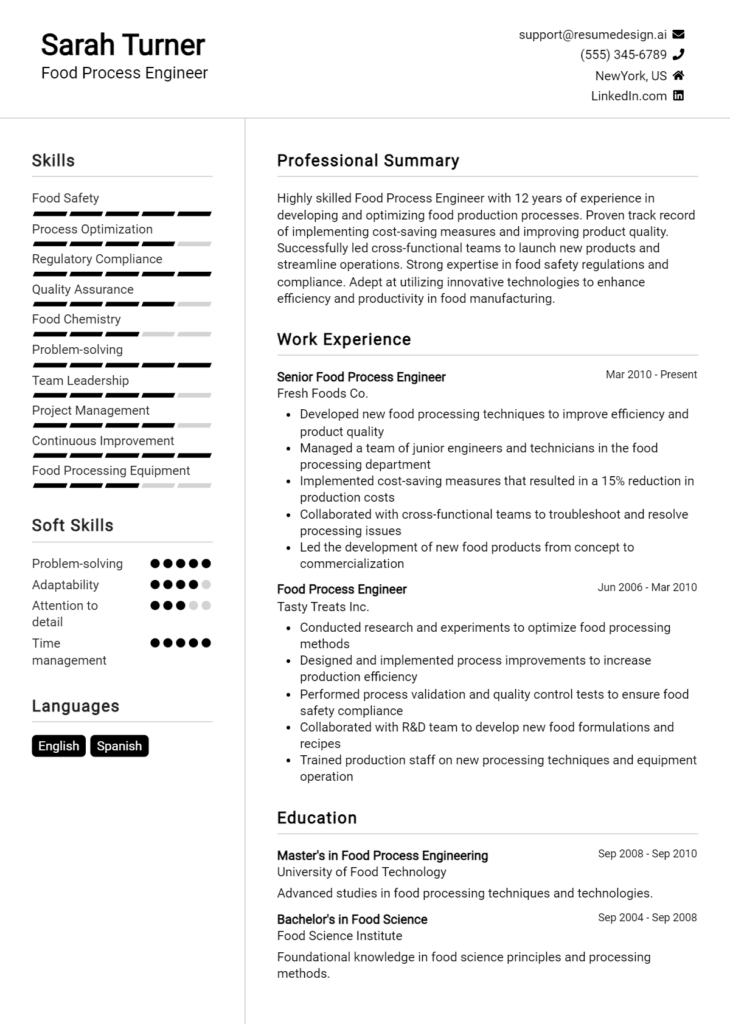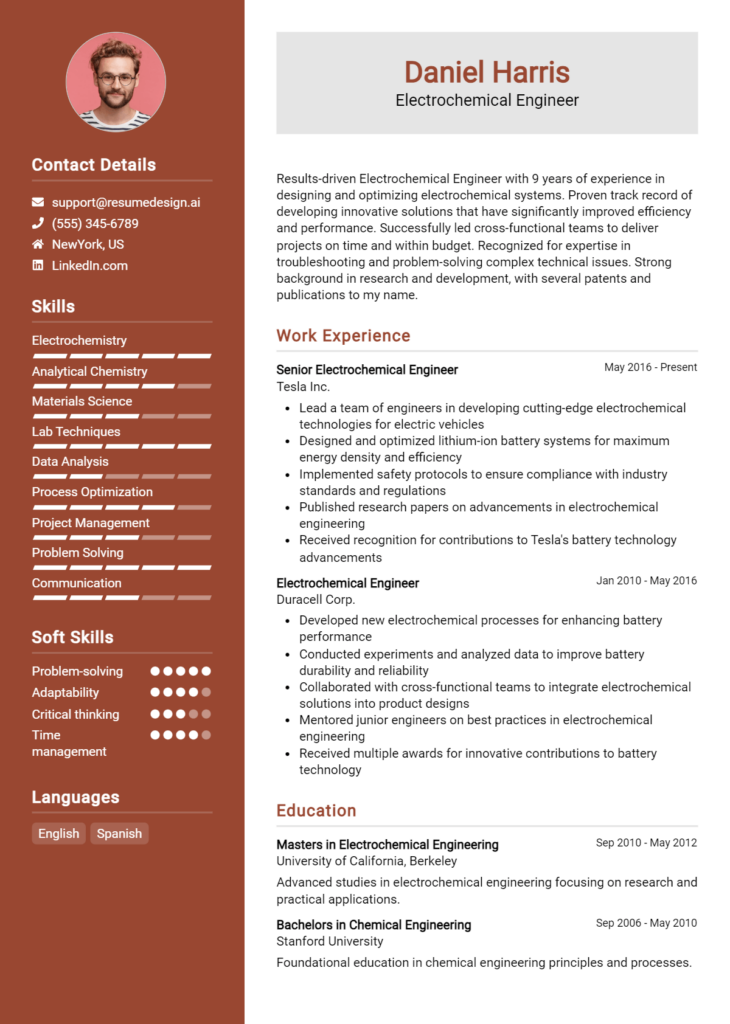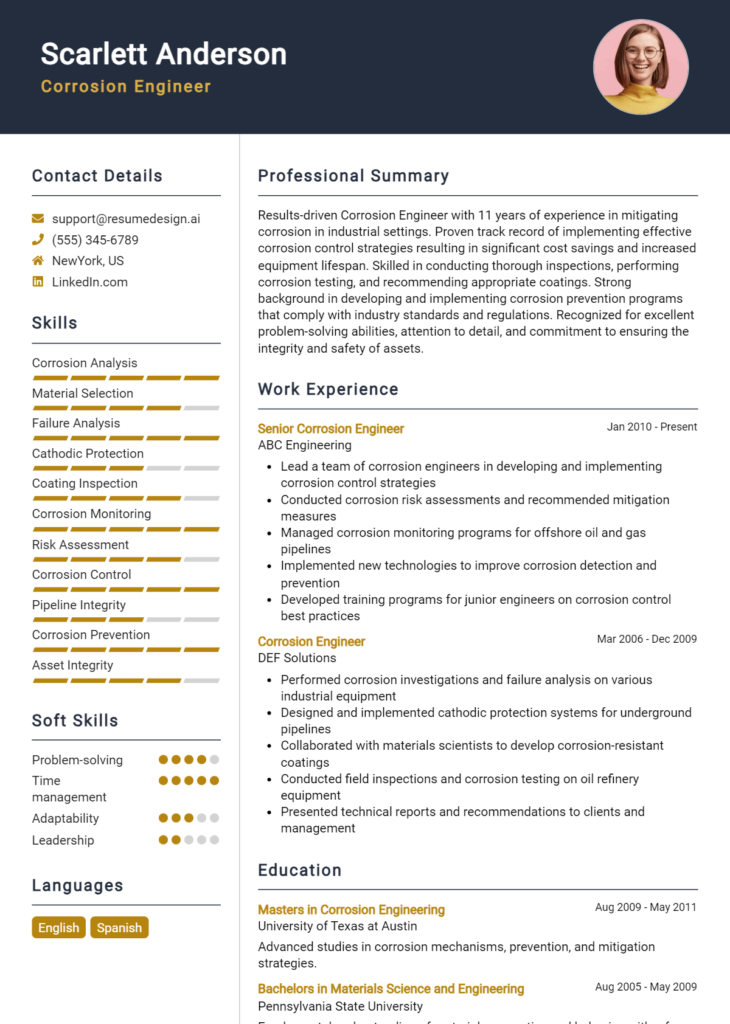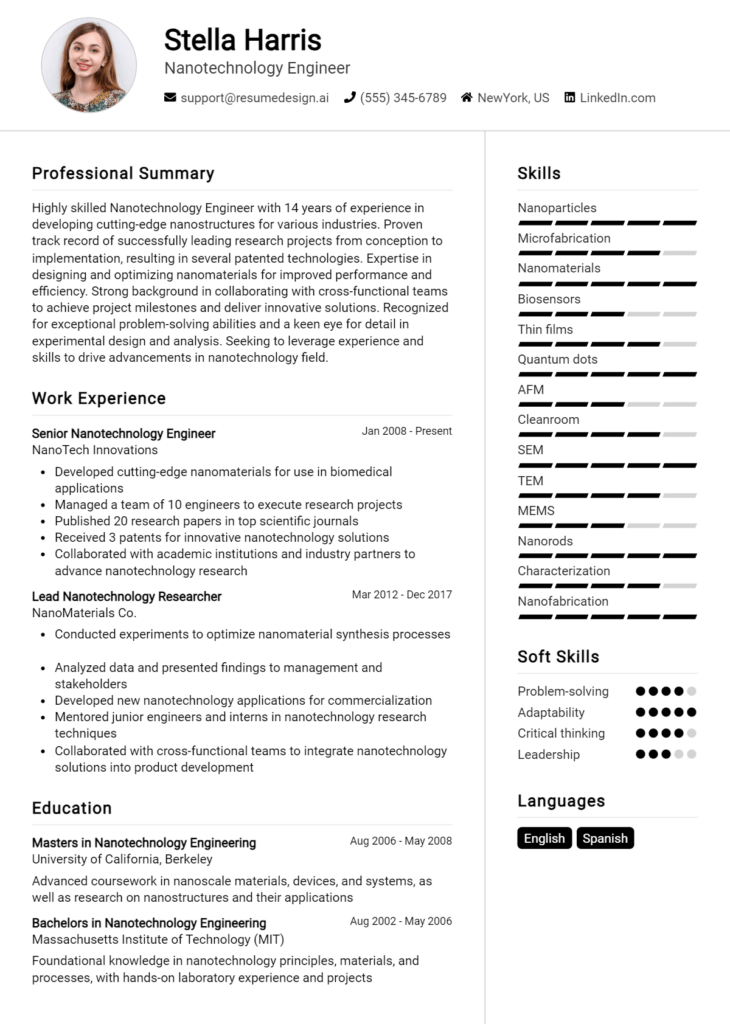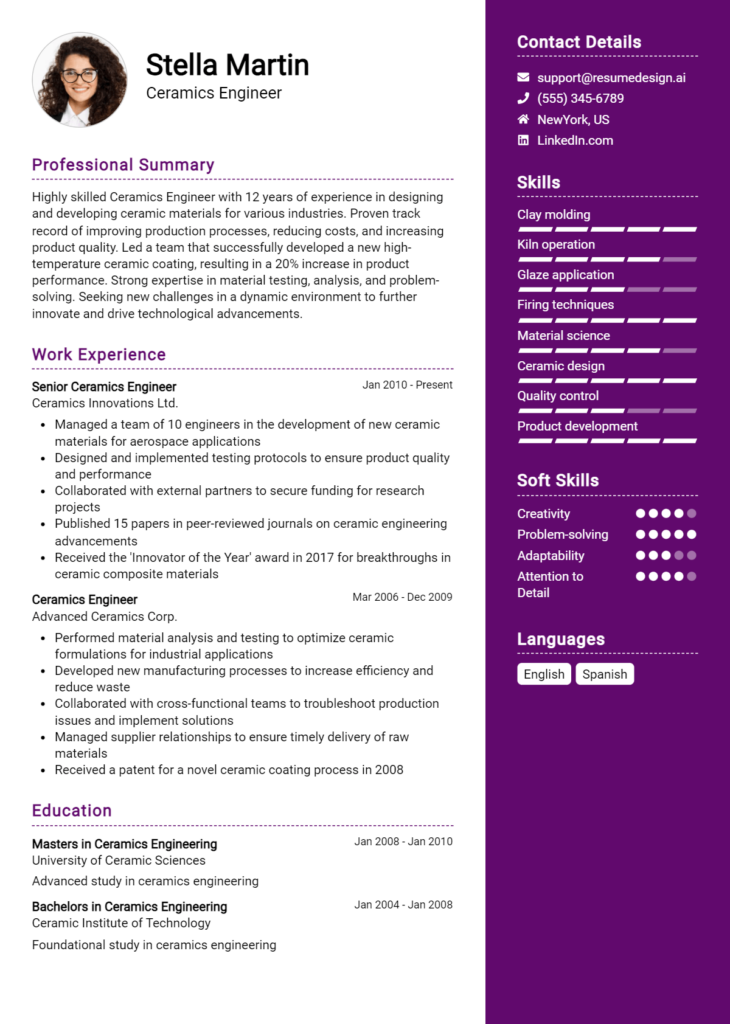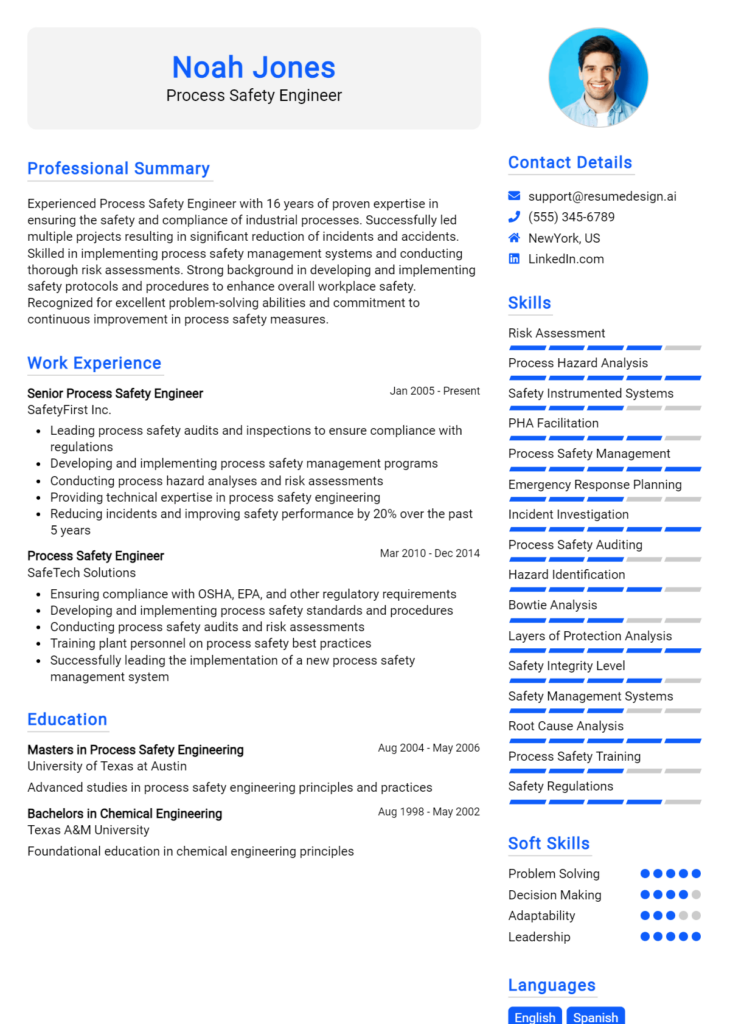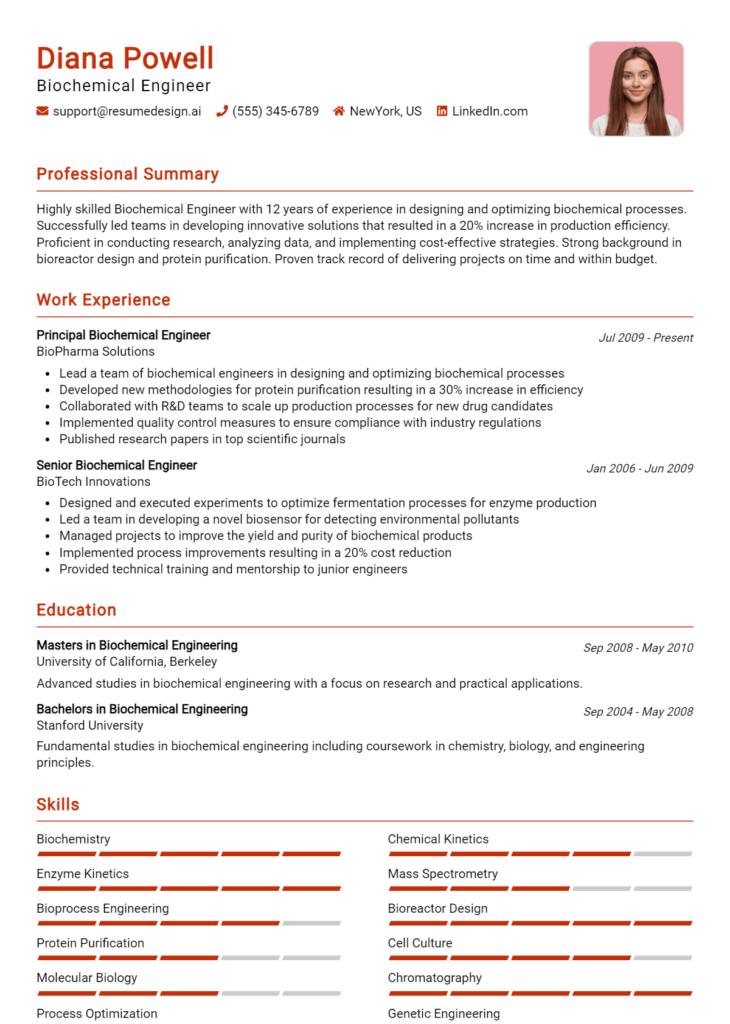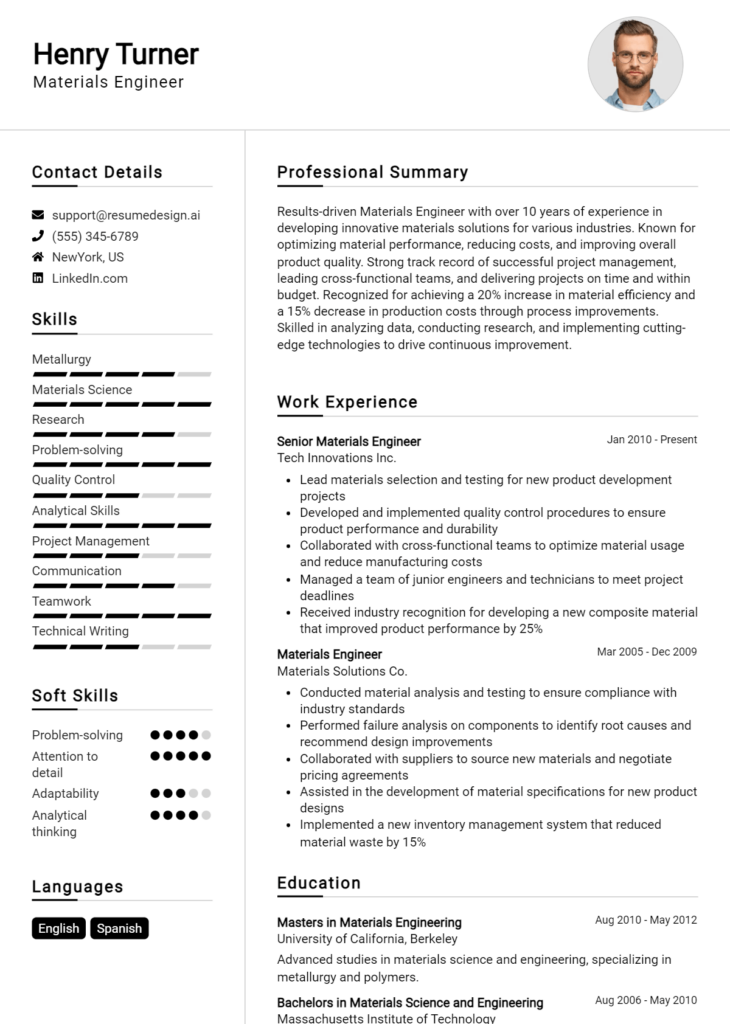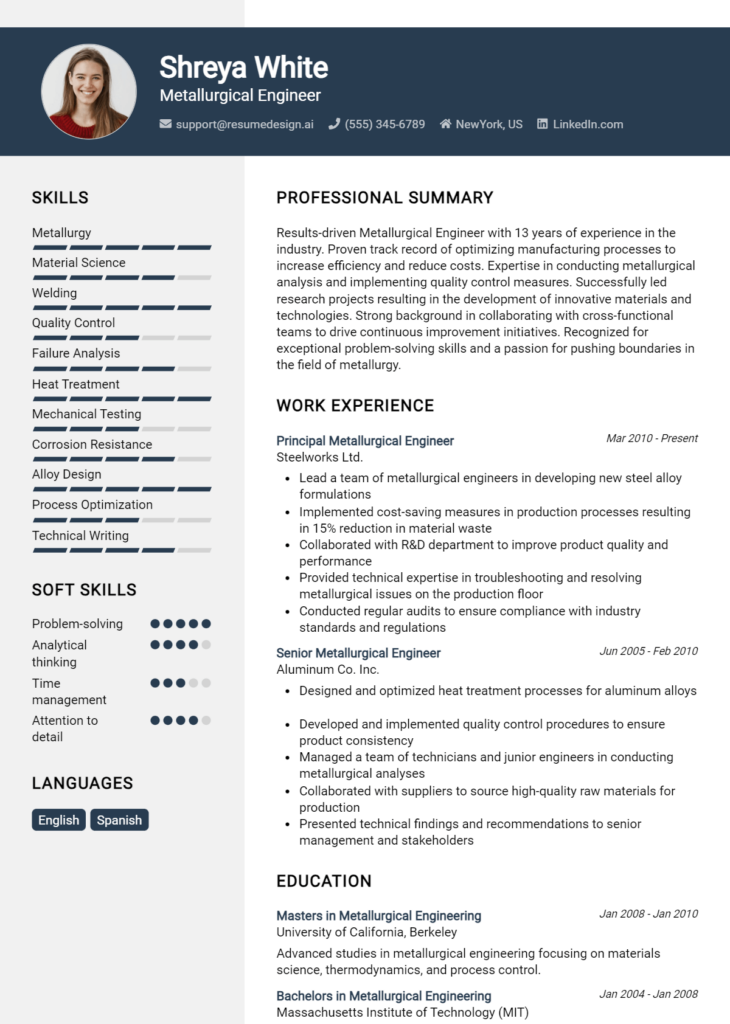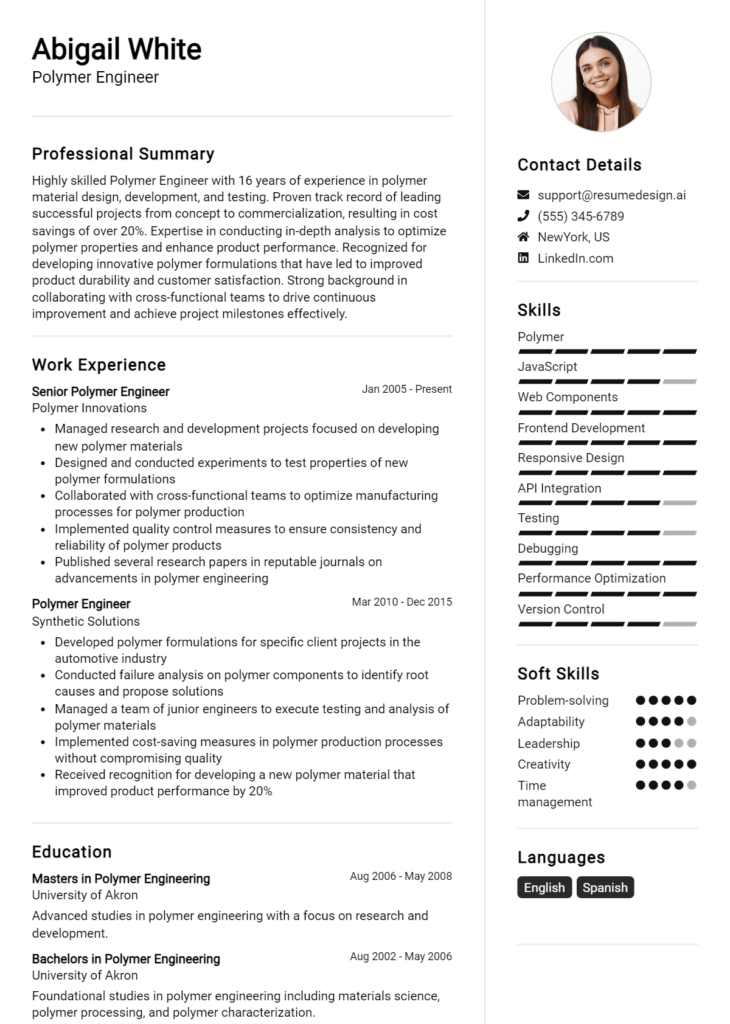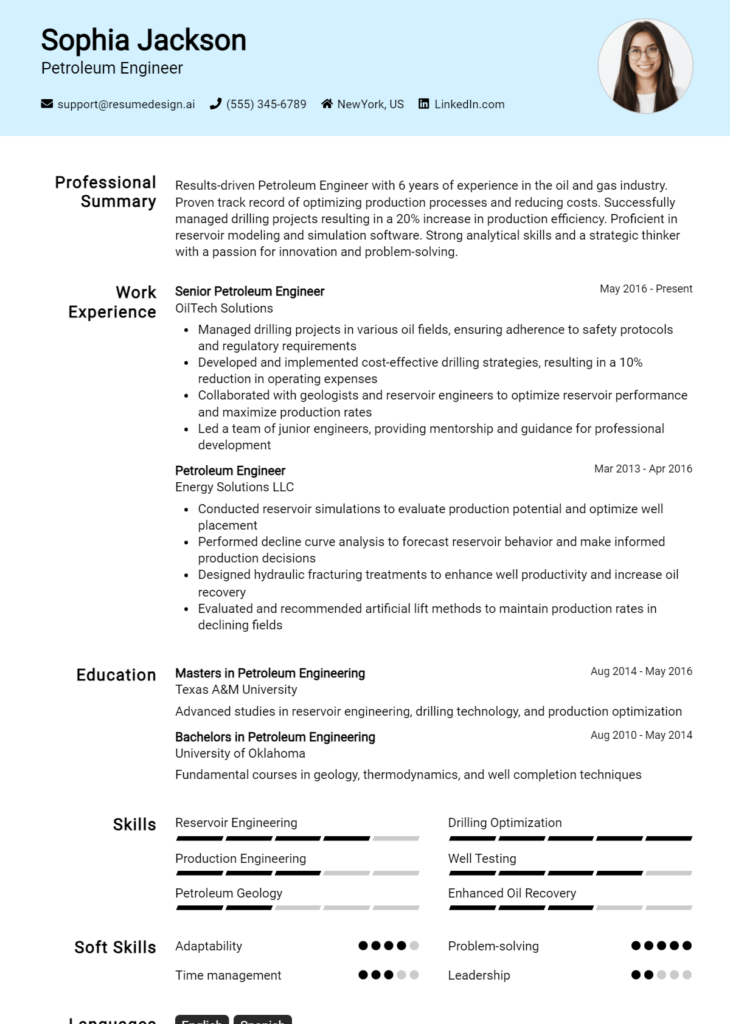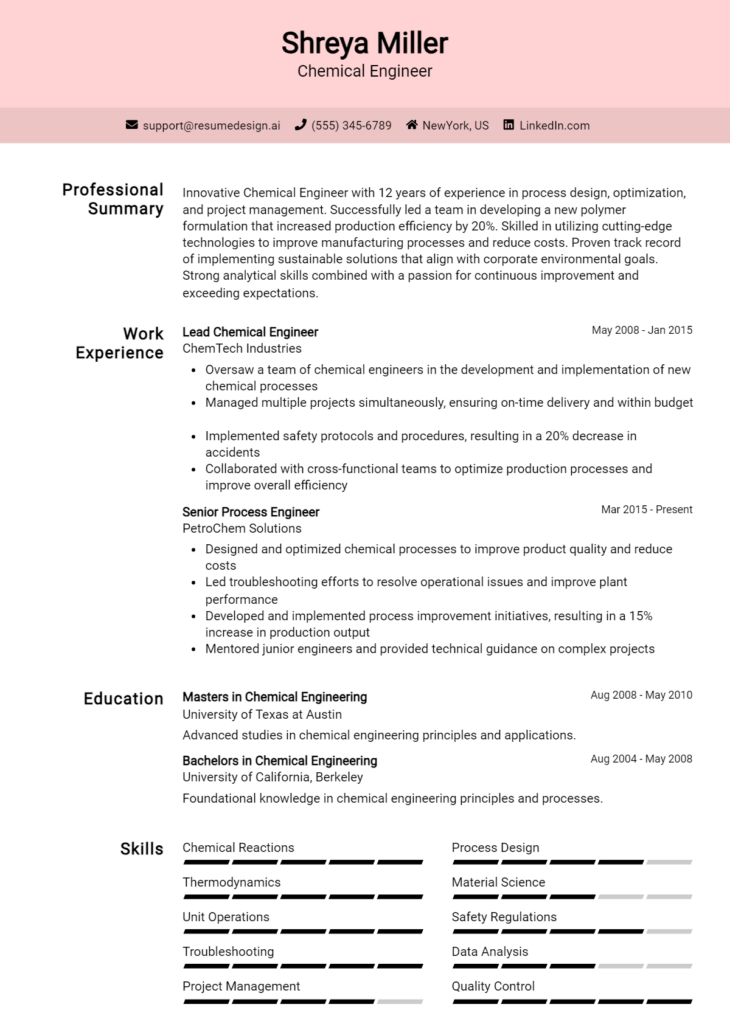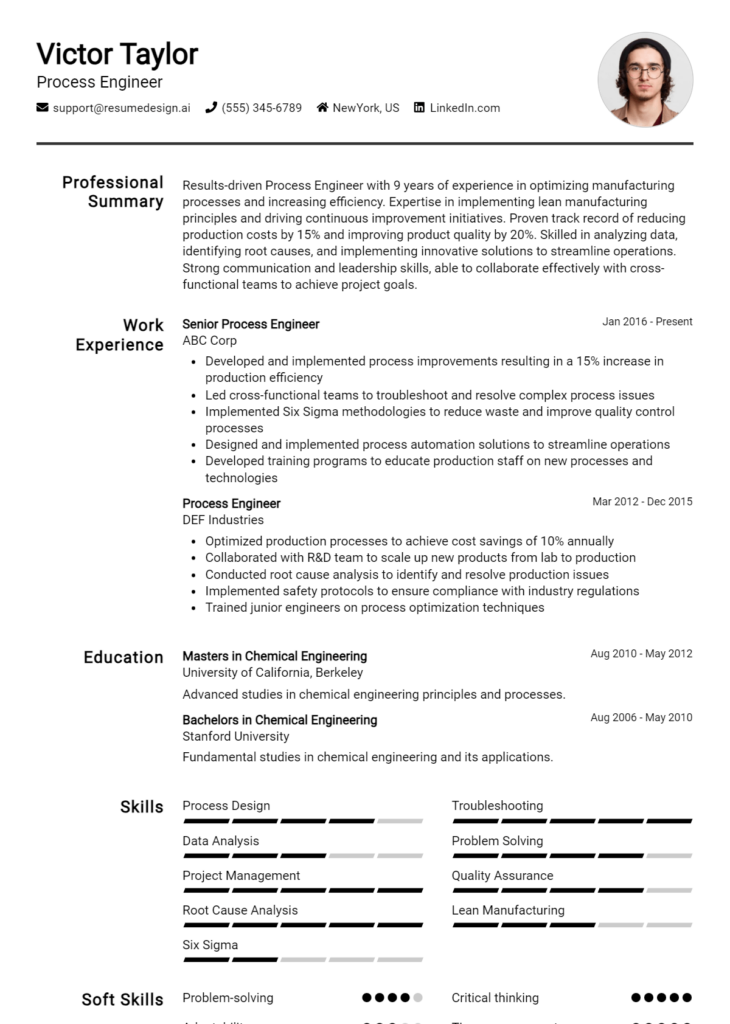Battery Engineer Core Responsibilities
A Battery Engineer plays a crucial role in the design, development, and optimization of battery systems, requiring a blend of technical knowledge and operational acumen. This position demands strong problem-solving skills to address challenges across various functions such as manufacturing, research, and quality assurance. Collaborating with cross-functional teams, a Battery Engineer ensures that battery technologies align with organizational goals, enhancing product performance and sustainability. A well-structured resume effectively highlights these qualifications, showcasing both technical expertise and the ability to drive innovation.
Common Responsibilities Listed on Battery Engineer Resume
- Design and develop battery systems for various applications.
- Conduct performance testing and analysis of battery prototypes.
- Collaborate with R&D teams to improve battery chemistry and materials.
- Oversee manufacturing processes to ensure quality and efficiency.
- Analyze data to troubleshoot and resolve battery performance issues.
- Develop and maintain documentation for battery specifications and standards.
- Implement safety protocols and compliance with regulatory requirements.
- Coordinate with suppliers to source materials and components.
- Participate in project management to align timelines and deliverables.
- Conduct market research to identify emerging battery technologies.
- Provide technical support and training to production teams.
- Stay updated on industry trends and advancements in battery technology.
High-Level Resume Tips for Battery Engineer Professionals
In the competitive field of battery engineering, a well-crafted resume serves as your first impression to potential employers, making it a critical tool in your job search. A standout resume not only highlights your technical skills and relevant experience but also demonstrates your achievements and contributions to the field. Given the rapid advancements and increasing demand for battery technology in various industries, it’s essential for candidates to present a compelling narrative that showcases their expertise. This guide will provide practical and actionable resume tips specifically tailored for Battery Engineer professionals to help you put your best foot forward.
Top Resume Tips for Battery Engineer Professionals
- Tailor your resume to match the specific job description by using relevant keywords and phrases.
- Highlight your educational background, focusing on degrees and certifications related to battery technology and engineering.
- Showcase relevant work experience, particularly positions where you developed or improved battery systems.
- Quantify your achievements, such as percentage improvements in efficiency, reductions in costs, or successful project completions.
- Emphasize technical skills, including proficiency with battery management systems, testing methodologies, and simulation software.
- Include any published papers or presentations related to battery technology to illustrate your thought leadership in the field.
- Demonstrate your problem-solving abilities with examples of challenges you faced and how you overcame them in previous roles.
- List any relevant industry knowledge, such as familiarity with regulations, standards, or emerging technologies in battery engineering.
- Keep the format clean and professional, using bullet points for clarity and ensuring easy readability for hiring managers.
By implementing these tips, Battery Engineer professionals can significantly enhance their resumes, making them more appealing to hiring managers and increasing their chances of landing a job in this dynamic and evolving field. A strong resume that effectively communicates your skills and accomplishments can set you apart from the competition and open doors to exciting career opportunities.
Why Resume Headlines & Titles are Important for Battery Engineer
In the competitive field of battery engineering, a well-crafted resume headline or title serves as a crucial first impression that can significantly influence a hiring manager's perception of a candidate. A strong headline encapsulates key qualifications and areas of expertise in a succinct and impactful manner, effectively summarizing the candidate's professional identity. It not only grabs attention but also sets the tone for the rest of the resume, emphasizing relevance to the position being applied for. By ensuring that the headline is concise and directly related to the job role, candidates can enhance their chances of standing out in a crowded job market.
Best Practices for Crafting Resume Headlines for Battery Engineer
- Keep it concise: Aim for one impactful phrase that summarizes your qualifications.
- Be role-specific: Tailor your headline to the battery engineering position you are applying for.
- Highlight key skills: Incorporate essential skills or technologies relevant to battery engineering.
- Use action-oriented language: Start with strong verbs or adjectives to convey your expertise.
- Include certifications or specializations: Mention any relevant certifications or specializations that enhance your candidacy.
- Focus on your accomplishments: If possible, highlight notable achievements that relate to battery engineering.
- Be authentic: Ensure that your headline accurately reflects your professional identity and expertise.
- Consider industry keywords: Use keywords that are commonly recognized in the battery engineering field to enhance visibility.
Example Resume Headlines for Battery Engineer
Strong Resume Headlines
Innovative Battery Engineer Specializing in Lithium-Ion Technology Development
Experienced Battery Engineer with a Proven Track Record in Energy Storage Solutions
Results-Driven Battery Engineer Focused on Enhancing Battery Efficiency and Performance
Certified Battery Engineer with Expertise in Renewable Energy Applications
Weak Resume Headlines
Engineer with Experience
Battery Expert Seeking Opportunities
Professional Looking for Work in Engineering
The strong resume headlines are effective because they are specific, relevant, and packed with keywords that immediately communicate the candidate's expertise and suitability for the battery engineering role. They give hiring managers a clear idea of what the candidate brings to the table. In contrast, the weak headlines fail to impress due to their generic nature and lack of detail, which does not provide any insight into the candidate's qualifications or strengths. Such vague titles are unlikely to capture attention or convey a sense of professionalism in a competitive job market.
Writing an Exceptional Battery Engineer Resume Summary
A well-crafted resume summary is essential for a Battery Engineer as it serves as a powerful introduction to your qualifications and professional background. A strong summary not only captures the attention of hiring managers but also succinctly showcases key skills, relevant experiences, and notable accomplishments that align with the job role. In a competitive job market, having a concise and impactful summary tailored to the specific position can set you apart from other candidates, making it easier for hiring managers to recognize your unique value proposition.
Best Practices for Writing a Battery Engineer Resume Summary
- Quantify Achievements: Use numbers and metrics to highlight your success and impact in previous roles.
- Focus on Relevant Skills: Emphasize technical skills and expertise that are directly applicable to the position.
- Tailor for the Job: Customize your summary to reflect the specific requirements and keywords mentioned in the job description.
- Be Concise: Aim for 3-5 sentences that clearly communicate your qualifications without unnecessary fluff.
- Highlight Industry Experience: Mention any specific experience in battery technology, energy storage, or related fields.
- Showcase Problem-Solving Abilities: Include examples of how you have effectively solved engineering challenges in previous roles.
- Use Action-Oriented Language: Start with strong action verbs to convey your proactive approach and impact.
- Include Certifications or Specializations: If you have relevant certifications, mention them to enhance your credibility.
Example Battery Engineer Resume Summaries
Strong Resume Summaries
Results-driven Battery Engineer with over 7 years of experience in designing and optimizing lithium-ion battery systems, achieving a 20% increase in energy density while reducing costs by 15%. Proven track record in leading cross-functional teams to develop innovative energy storage solutions.
Dynamic Battery Engineer skilled in battery management systems and testing methodologies, with a successful history of implementing advanced diagnostic techniques that reduced failure rates by 30%. Holds a Master’s degree in Electrical Engineering and has published research on battery lifecycle analysis.
Experienced Battery Engineer with expertise in solid-state battery technology, contributing to projects that enhanced safety and performance metrics by 25%. Adept at using simulation software to model battery behavior and drive product development from concept to production.
Weak Resume Summaries
Battery Engineer with experience in the field. I am looking for a job in a good company.
Motivated engineer interested in battery technology and energy solutions. I have worked on projects but don’t have specific details to share.
The strong resume summaries stand out due to their specificity and quantifiable achievements, clearly demonstrating the candidates' contributions and skills relevant to the Battery Engineer role. In contrast, the weak summaries lack detail, fail to present measurable outcomes, and appear overly generic, making it difficult for hiring managers to gauge the candidates' true potential and fit for the position.
Work Experience Section for Battery Engineer Resume
The work experience section of a Battery Engineer resume is paramount, as it serves as a comprehensive showcase of a candidate's technical skills, leadership capabilities, and ability to deliver high-quality products within the battery engineering domain. This section allows potential employers to assess how well a candidate aligns with industry standards, the depth of their experience, and their capacity to contribute to team success. Quantifying achievements, such as improvements in efficiency or reductions in costs, further enhances the impact of this section, making it crucial for candidates to present their work experiences in a clear and compelling manner.
Best Practices for Battery Engineer Work Experience
- Highlight specific technical skills relevant to battery design, testing, and manufacturing processes.
- Quantify achievements by including metrics such as percentage improvements, cost savings, or project completion times.
- Demonstrate leadership by detailing experiences managing teams or projects.
- Align work experiences with industry standards and best practices to show familiarity with current technologies.
- Include collaborative projects that showcase teamwork and cross-functional communication skills.
- Use action verbs to convey a sense of initiative and impact in your roles.
- Tailor your experiences to the specific job application, emphasizing the most relevant roles and contributions.
- Keep descriptions concise and focused on achievements rather than just responsibilities.
Example Work Experiences for Battery Engineer
Strong Experiences
- Led a team of 5 engineers in the development of a new lithium-ion battery prototype, resulting in a 30% increase in energy density and a 20% reduction in production costs.
- Implemented a quality control program that decreased defect rates by 15% in battery manufacturing, contributing to a more reliable product line.
- Collaborated with cross-functional teams to complete a major project ahead of schedule, achieving a 10% time savings and securing a $250,000 bonus for the department.
- Designed and executed comprehensive testing protocols for battery performance, leading to a 25% improvement in cycle life over previous models.
Weak Experiences
- Worked on battery projects with little detail on outcomes or contributions.
- Assisted in various tasks without specifying technical skills or achievements.
- Involved in team meetings but did not describe any leadership or initiative taken.
- Participated in the development of battery technology without quantifying results or impacts.
The examples provided illustrate a clear distinction between strong and weak work experiences. Strong experiences are characterized by specific, quantifiable outcomes and demonstrate leadership, technical expertise, and collaboration. In contrast, weak experiences lack detail, fail to showcase measurable impacts, and do not convey a sense of initiative or responsibility, making them less compelling to potential employers.
Education and Certifications Section for Battery Engineer Resume
The education and certifications section of a Battery Engineer resume serves as a vital component in showcasing a candidate's academic background, relevant industry certifications, and commitment to continuous learning. This section not only reflects the theoretical knowledge acquired through formal education but also emphasizes the practical skills gained through specialized training and certifications. By including relevant coursework, industry-recognized credentials, and ongoing education efforts, candidates can significantly enhance their credibility and demonstrate their alignment with the specific demands of the Battery Engineer role.
Best Practices for Battery Engineer Education and Certifications
- Focus on relevant degrees, such as Electrical Engineering, Chemical Engineering, or Materials Science.
- Include industry-recognized certifications, such as Certified Battery Technician (CBT) or certifications from organizations like the Society of Automotive Engineers (SAE).
- Detail relevant coursework that aligns with battery technology, such as Electrochemistry, Energy Storage Systems, and Battery Management Systems.
- Highlight any specialized training in battery manufacturing, testing, or safety protocols.
- Keep the information current, ensuring that all certifications and degrees reflect the latest standards in the industry.
- Use concise bullet points to improve readability, focusing on the most impactful qualifications.
- Consider including online courses or workshops that demonstrate a commitment to staying updated with industry advancements.
- List any honors or awards received during educational pursuits that are relevant to the field.
Example Education and Certifications for Battery Engineer
Strong Examples
- Bachelor of Science in Electrical Engineering, University of California, Berkeley, 2021
- Certified Battery Technician (CBT), National Institute for Certification in Engineering Technologies, 2022
- Completed coursework in Electrochemical Energy Systems, Texas A&M University, 2020
- Certification in Battery Management Systems, Institute of Electrical and Electronics Engineers (IEEE), 2023
Weak Examples
- Associate Degree in General Studies, Community College, 2010
- Certification in Basic Computer Skills, Online Learning Platform, 2019
- Bachelor's Degree in History, University of Michigan, 2015
- Outdated certification in Lead-Acid Battery Maintenance, 2010
The strong examples are considered robust as they directly relate to the core competencies and knowledge areas essential for a Battery Engineer, showcasing both relevant educational qualifications and current certifications that align with industry standards. In contrast, the weak examples represent degrees and certifications that lack relevance to the role or are outdated, ultimately failing to enhance the candidate's position in the competitive field of battery engineering.
Top Skills & Keywords for Battery Engineer Resume
A well-crafted resume is essential for a Battery Engineer, as it showcases not only technical proficiency but also the soft skills that are crucial in the field. Employers are increasingly looking for candidates who possess a balanced mix of hard and soft skills. Hard skills demonstrate a candidate's technical capabilities and knowledge, while soft skills reflect their ability to communicate, collaborate, and solve problems effectively within a team. A comprehensive skills section can significantly enhance a Battery Engineer's resume, making it stand out to potential employers and aligning with their specific needs. For a deeper understanding of how to highlight your skills, consider reviewing additional resources on skills and work experience.
Top Hard & Soft Skills for Battery Engineer
Hard Skills
- Battery chemistry and technology
- Electrochemistry
- Battery management systems (BMS)
- Energy storage systems
- Circuit design
- Performance testing and analysis
- Data analysis and modeling
- CAD software proficiency
- Manufacturing processes
- Quality assurance and control
- Safety regulations and standards
- Materials science
- Thermal management
- Prototype development
- Simulation software (e.g., MATLAB, Simulink)
- Research and development (R&D)
- Project management
Soft Skills
- Problem-solving abilities
- Effective communication
- Team collaboration
- Attention to detail
- Time management
- Adaptability
- Critical thinking
- Creativity and innovation
- Leadership potential
- Conflict resolution
- Decision-making
- Customer-focused mindset
- Analytical thinking
- Initiative and self-motivation
- Emotional intelligence
- Networking skills
- Willingness to learn and develop new skills
Stand Out with a Winning Battery Engineer Cover Letter
Dear [Hiring Manager's Name],
I am writing to express my interest in the Battery Engineer position at [Company Name] as advertised on [where you found the job listing]. With a robust background in electrochemistry and extensive hands-on experience in battery design and development, I am excited about the opportunity to contribute to your innovative projects. My passion for advancing energy storage technologies aligns perfectly with [Company Name]’s commitment to sustainability and cutting-edge solutions.
In my previous role at [Previous Company Name], I successfully led a team in the development of high-capacity lithium-ion batteries, which increased energy density by 20% while significantly reducing production costs. My expertise in materials science, coupled with my proficiency in computational modeling and simulation, enables me to design efficient battery systems that meet stringent performance requirements. I am particularly proud of my contribution to a project that resulted in a breakthrough in battery life cycle stability, which not only enhanced product reliability but also positively impacted customer satisfaction.
I am particularly drawn to [Company Name] due to your focus on innovative battery technologies and renewable energy integration. I believe my experience in optimizing battery performance through rigorous testing and analysis, along with my strong collaboration skills, make me a perfect fit for your team. I am eager to bring my knowledge of emerging battery technologies and my dedication to excellence to [Company Name], helping to drive forward the next generation of energy solutions.
Thank you for considering my application. I look forward to the opportunity to discuss how my skills and experiences can contribute to the success of [Company Name]. I am excited about the prospect of working with a team that shares my passion for innovation in the battery industry.
Sincerely,
[Your Name]
[Your LinkedIn Profile]
[Your Contact Information]
Common Mistakes to Avoid in a Battery Engineer Resume
When crafting a resume for a Battery Engineer position, it's crucial to present your skills and experience effectively, as this field demands precision and technical expertise. However, many candidates make common mistakes that can hinder their chances of landing an interview. Avoiding these pitfalls will help you create a polished and compelling resume that stands out to employers in the competitive energy sector. Here are some common mistakes to watch out for:
Generic Objective Statements: Using a vague or generic objective can make your resume blend in with the rest. Tailor your objective to reflect your specific interest in battery technology and the position.
Neglecting Relevant Skills: Failing to highlight specific technical skills, such as knowledge of battery chemistry, testing methodologies, or design software, can leave out essential qualifications that employers are looking for.
Overloading with Technical Jargon: While technical language is important, using too much jargon can alienate hiring managers who may not be specialists in your exact field. Aim for a balance that conveys expertise while remaining accessible.
Ignoring Quantifiable Achievements: Simply listing job responsibilities without quantifying achievements can make your contributions seem less impactful. Use metrics to showcase improvements you made, such as percentage increases in efficiency or reductions in costs.
Inconsistent Formatting: A visually chaotic resume can distract from your qualifications. Ensure consistent use of fonts, sizes, and spacing to create a professional appearance that is easy to read.
Omitting Soft Skills: Technical proficiency is vital, but neglecting to mention soft skills such as teamwork, communication, and problem-solving abilities can create an incomplete picture of your capabilities.
Not Customizing for Each Application: Sending out a one-size-fits-all resume can hurt your chances. Tailor your resume for each job application to align with the specific requirements and company culture.
Failing to Proofread: Typos and grammatical errors can undermine your professionalism and attention to detail. Thoroughly proofread your resume or ask someone else to review it for mistakes before submitting it.
Conclusion
As we conclude our exploration of the Battery Engineer role, it's essential to reflect on the key responsibilities and qualifications that define this position. Battery Engineers are crucial in developing and optimizing energy storage solutions, focusing on performance, safety, and sustainability. They engage in rigorous testing and analysis to enhance battery technologies, ensuring they meet industry standards and consumer needs.
Additionally, the demand for skilled Battery Engineers continues to grow as electric vehicles and renewable energy technologies gain prominence. This presents an exciting opportunity for professionals in the field to advance their careers and make significant contributions to the future of energy.
With this in mind, we encourage you to take a moment to review your Battery Engineer resume. Ensure it effectively highlights your skills, experiences, and accomplishments in line with industry expectations. To assist you in this process, consider utilizing available resources such as resume templates, which can provide a polished format; resume builder, which offers a user-friendly interface to create your resume; resume examples for inspiration; and cover letter templates to complement your application.
Your next career move could be just around the corner, so take advantage of these tools to present your best self to potential employers!

